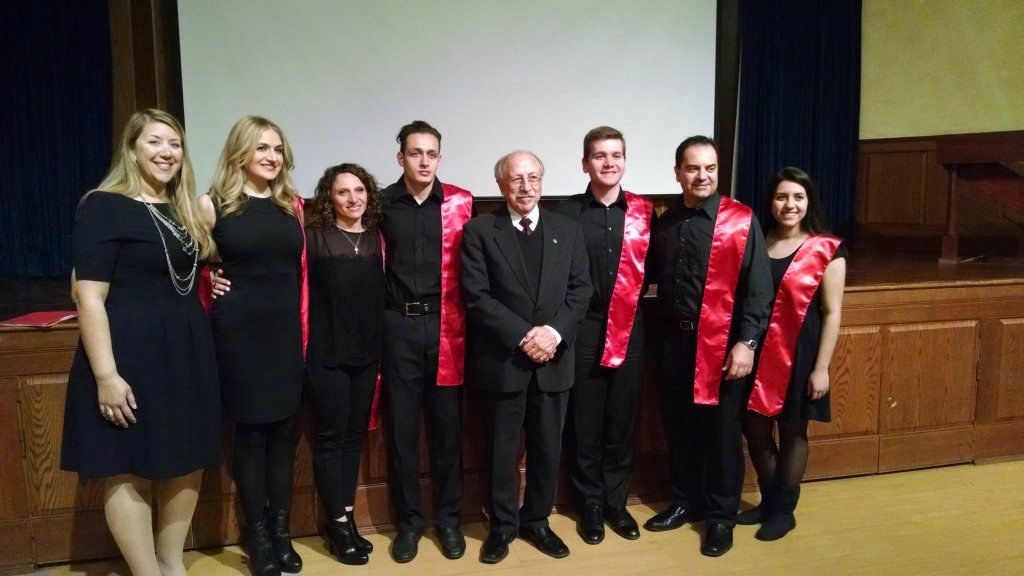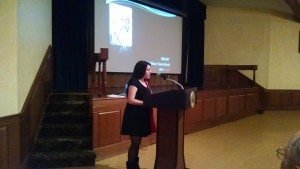On March 7, Dr. Herand Markarian presented his new book, The Martyred Armenian Writers 1915-1922, at the Armenian Community Center’s Shahnazarian Hall in Glenview, Ill., and then unleashed a group of 7 young and powerful readers, one as young as 17, onto the capacity audience. The readers, representing the youth and future of Armenia, delivered excerpts from the book, and brought many in the audience to tears and rousing applause. The event was organized by the Hamazkayin Armenian Educational and Cultural Society as part of the Chicago area’s activities devoted to marking the 100th anniversary of the Armenian Genocide.

After brief opening comments, Talin Artinian, the mistress of ceremonies, invited Chicago Hamazkayin Chairperson Rita Arakelian to offer her welcoming remarks. Artinian then introduced Markarian, which included a special video message from Armenian Diaspora Minister Hranush Hakobyan, who recognized Markarian’s numerous contributions to Armenian culture. Artinian then invited Markarian to address the audience.
Markarian began his presentation by describing Western Armenian literature as it reached its zenith prior to the genocide. He talked about the arrests of April 24th, and the impact the genocide had not only on the Armenian nation but also on Armenian culture. He then presented each of the martyred writers featured in his book, asking the audience to note their ages, displaying their photos, listing their pseudonyms, and describing their writing.
Artinian then joined Markarian at the podium, where she introduced seven young Armenians—Maral Aprahamian, Sona Birazian, Alex Boyajian, Greg Boyajian, Khachuig Dakarian, Houri Papazian and Meghedi Tamazian—many of whom were near the same age as the writers whose work they would recite. The readers, dressed in all black and wearing red stoles across their shoulders, turned what could have been an ordinary lecture about a book into an unforgettable miniature drama. During their recitations, Markarian covertly choreographed the production from his seat in the front row, projecting images behind the readers that helped to spiritually connect the audience with the martyred writers. Indeed, many in the audience were moved to tears during the reading of the translation of Siamanto’s “Strangled,” showing the power and authenticity of the translation. The readers concluded their recitations by chanting “Aha, menk goukank!” in unison, which was greeted by a standing ovation from the audience. Markarian then treated the Armenophilic Chicago audience to a work by Siamanto with a recitation in his own impeccable Western Armenian.

The program transported the audience back 100 years to once again hear youthful voices long silenced. But across that 100 years, the sad fact is that assimilation, aided by English-language media, radio, television, and now computers, has erected a language barrier between English-speaking Armenians and Armenian literature. Through his book, Markarian has made some of the most powerful passages written by some of the greatest Armenian writers accessible to not only English-speaking Armenians, but also the 700 million other speakers of English worldwide.
The nearly 250-page book is made up of three parts: the first provides a brief background about Armenian identity and Western Armenian literature; the second offers a glimpse at the historical accounts of the Armenian Genocide, including details of the martyrdom of Taniel Varoozhan, Roupen Sevag, and Indra; and the final part includes Markarian’s translations of both pose and poetry from Western Armenian to English. While this book opens the door to Western Armenian literature to English speakers, it is hoped that it will also rekindle interest in works in their original Western Armenian.
At the conclusion of the presentation, Markarian said he always felt the need to close his works with an epilogue to look to the future. He then read the epilogue to his book, which tied the deep sense of loss from the genocide with a vision of hope, illustrated through the light of a candle.
Following the program, the entire stock of The Martyred Armenian Writers 1915-1922 sold out within moments. Despite the disappointment that many felt at not being able to obtain a copy of the book immediately, the audience lingered over coffee and pastries, discussing the powerful program they had just experienced. The book will soon be going into a second printing, and there is already an initiative to sponsor copies for libraries, in an attempt to introduce these great writers to the broader American audience. Readers interested in purchasing the book, or in sponsoring a book for a private or college library in the name of a martyred ancestor, may contact the author by writing to Libra-6 Productions, 160 Waters Edge Congers, NY 10920. Books are available for $20 plus $5 shipping.



Be the first to comment